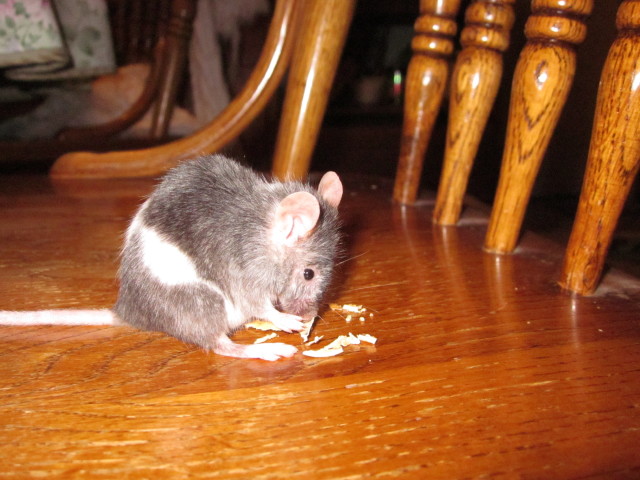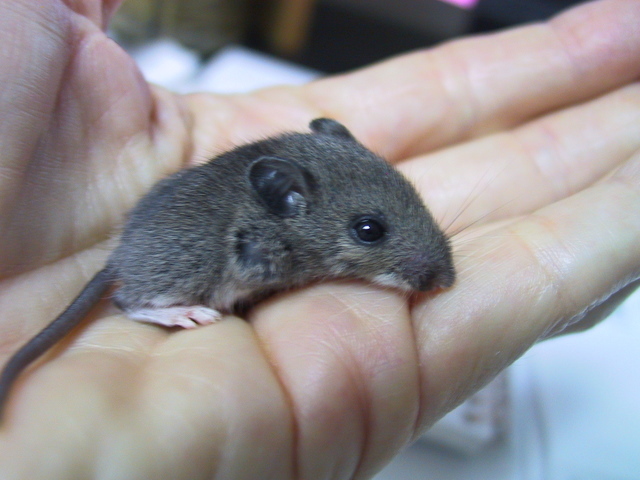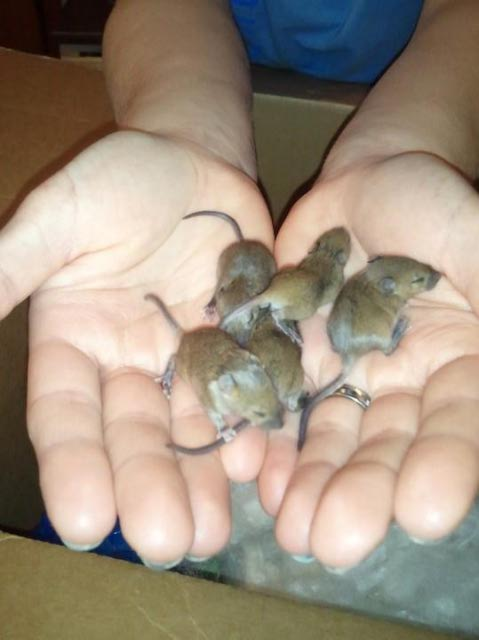QuestionHello. I first and foremost want to thank you for your expert advice on mice; it has been extremely informative. My wife and I have a nice little family of deer mice in our garage currently. Being from an area without deer mice, I had never seen them before. She came in with one who got itself stuck in a bottle and I thought it was a house mouse--my concern was that we were going to start with 2 or 3 and end up with several hundred in our house. However, I realize now they are just getting inside during the winter time and will be heading out in spring. They are so inquisitive and when we go into the garage, they barely even scurry.
My fear is hantavirus, so I was just looking up stuff about it. I am a researcher by trade and teach statistics. I actually took the following quote from your website as an example:
"The population of the U.S. is over 300,000,000. The chance of getting hit by lightning in your entire lifetime is one in 3000, or approximately 1 person in 100,000. The chance of getting the hantavirus is 23/300,000,000, or 1 in 13,000,000. That makes you 130 times more likely to get hit by lightning then to contract the hantavirus; even then, only about 7-8 of these yearly cases result in death. The incidence of drowing in the bathtub is 1 in 800,000. "
I just wanted to "correct" this; the disclosures of advice and such on the site are likely enough, BUT it could even be a liability issue. Please don't take this as me trying to be demeaning or otherwise a smartass. I'm not. Your mistake is a common one, and I want to also clarify that I strongly agree with you that the odds of death by hantavirus are really low. However, I do want to point out a couple of statistical errors that make your estimates a bit misleading.
First, comparing death in a bathtub to contracting hantavirus is not really a proper comparison because you are basing one on the population of the United States and one on the cause of death in the United States. Moreover, though your lifetime chance of death from drowning in a bathtub is likely what you wrote, consider that the average American (HOPEFULLY) bathes much more than once per year. So if you consider the chance of dying in a single dip in the bath, they are WAY less than what is written. That said, my main concern is with the hantavirus risk comparison with winning the lottery or being hit by lightning. That risk comparison assumes the average person and does not consider special circumstances.
For example, I just looked at a website on fatalities from base jumping. Since 1999, it appears that 18 people in the United States have been killed while base jumping. Since 1999, I estimate that about 20,000,000 people have died in the United States (based on CDC averages). So 18/20,000,000 deaths were from base jumping. Using the same logic as the hantavirus, this would be like telling someone thinking of base jumping that they have an 18 in 20,000,000 chance of dying while base jumping. However, I have a 0% chance of dying while base jumping because I won't do it. And to consider the ACTUAL risks from base jumping, we would really need to figure out how many people go base jumping each year, how many times they do it, and how many of THOSE lead to death. THAT would tell us the actual risk factor.
So going back to hantavirus, the stats make the implicit assumption that everyone in the United States is interacting with wild deer mice. That's not the case, though. What you would have to calculate is how many people are exposed to deer mice (or to their waste) and how many of them get hantavirus. Certain things can most certainly drive up the risk factors (e.g., catching the mice, playing with them, etc.).
Again, I would imagine that the risk of hantavirus under these conditions is still really small, though in one study approximately 14% of wild deer mice in a particular region (most likely 4 corners) carried hantavirus. So there is greater than a 1 in 10 chance that people dealing with wild deer mice in these areas have the potential to be exposed to hantavirus. Because there is little research on the transmission rate (it would be tough to study), there is no way of really determining the odds of catching it from an infected deer mouse (or two or three). Like with base jumping, the person who is NEVER exposed to a rodent carrying hantavirus won't be infected.
Those statistics have nothing to do with the risk of catching hantavirus from bringing home a deer mouse or letting them live in your garage or whatever. Again, I would imagine that the odds of catching hantavirus under these specific situations are still quite low, but they are dramatically higher than the odds you have presented. Really, to even compare the odds of the general public dying from hantavirus is not even related to the odds of a person who encounters the mice to die from the disease because the average person wouldn't try to save them, keep them, etc. The odds of an American being killed by a king cobra are pretty slim, but you surely wouldn't use that evidence when someone asks, "Do you think it's a good idea to keep a king cobra as a pet?"
Truth is, no one really knows the exact risk of catching hantavirus from captive deer mice (or non-captive ones even). I do not know if anyone has caught it from pet deer mice (caught in the wild--obviously not from a breeder). However, I do know that the odds are WAY higher than those presented.
Just something to think about. Like I wrote, I am sure that you have plenty of disclosures and such. But if someone were to take your "odds" advice too seriously, it wouldn't take much for someone to demonstrate that those odds are misleading and that the risk is much higher than demonstrated. A good attorney can get around disclosures fairly easily, especially if they can demonstrate gross negligence. In my opinion, I'd just say the odds are likely very low and keep it at that...or in all honesty, I would just refer someone to the CDC and not take the risk!
We still think the ones we found are super cute, and we are still debating on what to do with them (as they are starting to be a wee bit destructive in the garage).
AnswerHi!
Actually I figured that out later... I'm not able to delete questions/answers from the site, so when I make a mistake there's not a lot I can do about it. Another mistake I made, though with fewer legal ramifications, is how mice go into heat. I hate the idea of people researching and getting the wrong answer-- indeed when I tried researching it myself, my incorrect answer came up on the first page. Ulp!
I've asked about this but they just aren't set up to be able to delete. I guess if someone pointed out that a comment was illegal or harmful to the public in some way, they'd figure out how. I'm afraid some people must make worse mistakes than I do.
There is however something useful you can do, I think. When you read the answer, there ought to be a place to add a comment. You could point out simply the fact that because most Americans encounter bathtubs more often than they do field mice, the two stats are not comparable.
I'm actually going to post this so it will come up in a search too!
Thanks a lot for your concern!
squeaks n giggles,
Natasha

 weird bump on mouse
QuestionCaramels leg
QUESTION: My oldest mouse h
weird bump on mouse
QuestionCaramels leg
QUESTION: My oldest mouse h
 Testing mouse for allergies
QuestionMouse scratching
QUESTION: Lately Ive no
Testing mouse for allergies
QuestionMouse scratching
QUESTION: Lately Ive no
 Scratch becomes open wound
Question
Nicky as baby
I rescured a baby mouse a couple
Scratch becomes open wound
Question
Nicky as baby
I rescured a baby mouse a couple
 respiratory infection in mouse colony
Question
Heres looking at you
Hi Natasha,
I raise rats
respiratory infection in mouse colony
Question
Heres looking at you
Hi Natasha,
I raise rats
 5 baby mice
Question
The babies
I work at a pet store and wh
5 baby mice
Question
The babies
I work at a pet store and wh